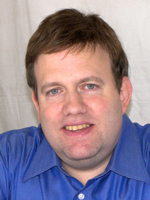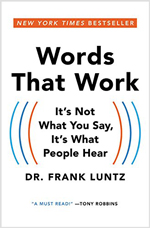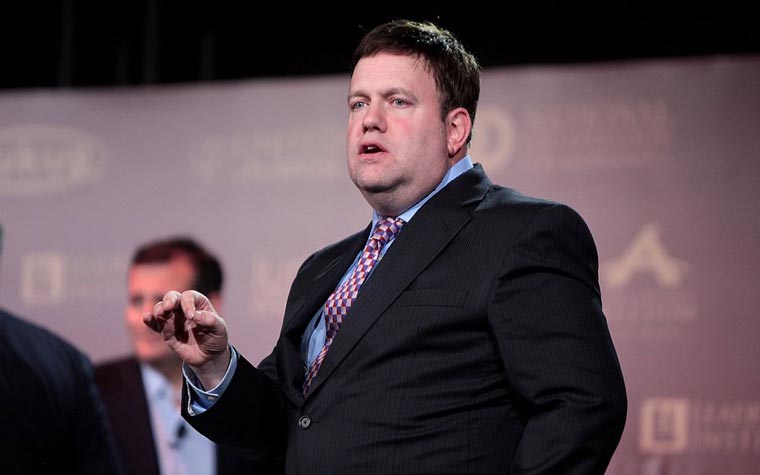Frank Luntz had doubts about the effects of climate change, but now he advocates the importance of stopping it
A pandemic is still brewing across the globe and a tumultuous American election is only months away. The future is foggy, but one thing is for certain: Dr. Frank Luntz, an influential communications consultant renowned for his work as a pollster and political strategist, is determined to keep pushing ahead for climate action.
Luntz needed to see firsthand the effects of global warming; he went to Alaska to observe the ice caps melting, and traveled to numerous countries to see the devastating impact on a multitude of species.
“There’s never been a better opportunity to rethink our climate policies,” Luntz says from his home in Los Angeles. “We are rethinking everything; our politics, our educational system, our economics, our foreign policies, and the environment. Everything is going through a fundamental examination.”
Two decade ago, Luntz was on the other side of the debate surrounding climate change. He had, in fact, advised Members of Congress to use the phrase climate change as a softer sell instead of the more ominous phrase global warming. Since then, Luntz has dramatically altered his viewpoint and remains steadfast in his convictions to combat climate change.
“The science has changed. Life has changed. Our climate has changed,” he says.
Luntz, who is 58 years old and an expert on political and corporate messaging for the two decades, has written and supervised more than 2000 focus groups, surveys and ad tests across the globe. He’s been a consultant on the NBC hit show The West Wing but is best known for his political commentary on numerous talk shows including 60 minutes, Squawk Box, Nightline and Real Time with Bill Maher, Fox News and HBO.
Online, you can also catch Luntz giving a riveting TED Talk, wearing his signature blue blazer, connecting with his audience as he passionately discusses the state of a divided America, a fractured world, and the need for a language that can help unite people.
Luntz once considered a fulltime career in academia- he has a Ph.D. from Oxford University, and in his late twenties began teaching as an adjunct professor at his alma mater, the University of Pennsylvania, where he would remain for close to a decade. At age 29, he became a Harvard University Institute of Politics Fellow, and at the same time continued to build a successful career in the political arena, which included serving as an election consultant at home and to other countries around the world such as Canada, the U.K., Ireland, Israel, Austria, Italy and the Ukraine.
Luntz’s entrée into the world of climate action began back in 2009, when he was asked to meet with the Environmental Defense Fund (EDF)- a nonprofit environmental advocacy organization- to help with the language needed to reach the American people about issues surrounding global warming. After crisscrossing the country conducting focus groups and surveys, Luntz and his team urged the EDF to create a policy and messaging strategy that included promoting cleaner air and safer water. Although many environmental groups jumped on board, some did not, ultimately frustrating Luntz.
“I always like to focus on having an impact. The argument over the degree of global warming don’t really matter,” he explains. “What matters to most folks is the impact of the policies. What matters is the carbon that goes through the air. What really matters is whether we have safe water that we can drink and air that we can breathe.”
Through his research over the past decade, Luntz discovered that advocates of climate change were often selling only the “status quo.”
“Sustainability means that we will have exactly what we have 20 years from now and 200 years from now. And that’s not what the public wants,” he remarks. “The public wants our water to be safer. It wants our air to be cleaner. It wants human life to be healthier.”
Luntz believed the new language he developed around climate change could do much more.
In July 2019, Luntz was one of three Republicans invited by Senator Brain Schatz, a Democrat, to speak to the front of the U.S. House Select Committee on the Climate Crisis about taking action on climate change. He initially declined, stating that the climate and the environment should not be a Republican or Democratic issue. But when he was told six senators would be in attendance, he changed his mind.

(Photo © Larry D. Moore)
Luntz thinks that the time is now to make countries accountable for the pollution they produce, especially China.
“Hell, they made us all sick. Let them lead the way to make us healthy again,” he says emphatically. “Factories should not be able to reopen unless they reduce climate emissions. We have the chance to do it right- right now.”
Most recently, Luntz has been imagining a new lexicon for the future that does not actually involve the word “climate”.
“’Recycle, reuse and repurpose. ‘It’s a better way to live and a way that we can make differences to our environment while not undermining our economy,” he says. “It’s the equivalent of a circular healthier economy. Instead of single use or multiple use, you have eternal use.”
This new environmental language came out of research Luntz conducted for a joint American-Norwegian global initiative sponsored by the Council for a New Economy.
Although he is pro nuclear energy, Luntz points out that the environmental community is divided on this issue.
“There’s so much research in this area and I know that it is not enough to depend on water, solar or wind but nuclear energy can get us there and it’s a carbon free fuel.”
Luntz grew up in West Hartford, Connecticut, in a family where an open dialogue of discussion was always encouraged and reading a diverse array of newspapers and magazines was an expected and integral part of his daily life. He learned not only to simply respect those he disagreed with but also to embrace them and listen carefully to their thoughts to understand their perspectives.
He credits his father for encouraging his sense of humor and his mother for instilling in him the importance compromise.
“Compromise is an ugly word in politics today. If you’re a compromiser, people will say you are a sell out. I don’t believe that,” Luntz says. “Today, more than ever, if you can get 80 percent of what you’re seeking- take it.”
A self-proclaimed “seeker of the truth- which he says he’s been since joining the debate club in fifth grade – Luntz started his own YouTube talk show #FridayswithFrank – in reaction to the acrimony on many cable news shows. In one hour, he covers what matters most to Americans from COVID-19 to the 2020 election, from the economy to entertainment. Guests have included Tony Blair, Tim Allen, Joe Torre, Maria Bartiromo, and Larry King.
Luntz is disheartened about the state of his divided nation and worried about its future, pointing out how people treat one another with a lack of respect and decency. He compares the fall of America with the previous great empires in history that no longer exist.“Just because you are great once doesn’t mean you will always be great.”
After 25 years in the political communication business, Luntz felt it was time to get back in the classroom to share his wisdom with young people from across the globe – he currently teaches at NYU Abu Dhabi.
 “I don’t want students to end up with my convictions but I desperately want them to share my passion for learning and commitment to the truth,” he says.
“I don’t want students to end up with my convictions but I desperately want them to share my passion for learning and commitment to the truth,” he says.
He is also the author of several books including, Words That Work: It’s Not What You Say, It’s What People Hear. (2007).
Despite having a stroke in January 2020, Luntz is thankful for the many close friends and colleagues in his life who have supported him in his struggle over the last months, especially philanthropist and financier, Mike Milken, and Kevin McCarthy, Republican leader of the United States House of Representatives.
“The truth still matters. Life is a conundrum. It’s a jigsaw puzzle. I still can’t put together all the pieces but I’m going to try.”
Despite his past views, Luntz is dedicated to being part of the solution in making positive change for the future of his country and the world.
This article by Rena Godfrey appeared in the Winter 2020 issue of Lifestyles Magazine.
Top photo © Gage Skidmore
